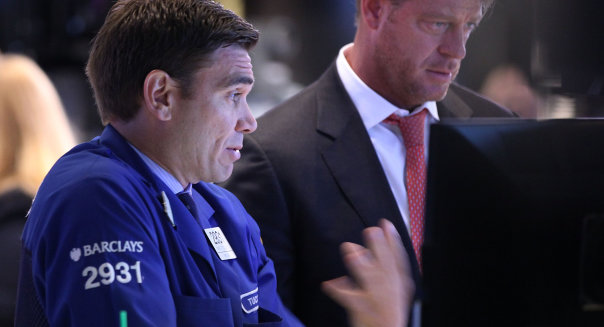
NEW YORK — U.S. stocks fell in a volatile Monday session as Greeks resoundingly backed their government in rejecting the austerity terms of a bailout and China implemented emergency measures to stop a selloff in Shanghai’s market.
Greek Prime Minister Alexis Tsipras promised German Chancellor Angela Merkel that Greece would bring a proposal for a cash-for-reforms deal to an emergency summit of eurozone leaders Tuesday, a Greek official said. It was unclear how much it would differ from other proposals rejected in the past.
Equity futures tumbled at the open late Sunday after Greeks voted no to the terms imposed by its creditors. However the S&P 500 didn’t fall more than 1 percent throughout the Monday session and even turned positive in morning trading.
Greece can’t pay their bills, there’s no middle ground there and other countries are going to have to foot the bill and they are angry.
Though Greece is causing a lot of uncertainty, a deal should get done to keep them in the eurozone, according to Karyn Cavanaugh, market strategist at Voya Investment Management in New York.
“Greece can’t pay their bills, there’s no middle ground there and other countries are going to have to foot the bill and they are angry,” she said.
But more than billions in debt are in play as “Greece is the southern gateway to Europe. The strategic value is not being quantified.”
The Dow Jones industrial average (^DJI) 46.53 points, or 0.3 percent, to 17,683.58, the Standard & Poor’s 500 index (^GSPC) lost 8.02 points, or 0.4 percent, to 2,068.76 and the Nasdaq composite (^IXIC) dropped 17.27 points, or 0.3 percent, to 4,991.94.
Weighing further on investor sentiment, Chinese brokerages and fund managers vowed to buy massive amounts of stocks as Beijing unleashed an unprecedented series of support measures to stem a decline of nearly 30 percent in the main Shanghai index over the past three weeks.
“People see ’emergency measures’ and they think ‘that can’t be good,’ ” said Voya’s Cavanaugh.
The Shanghai index rose 2.4 percent overnight but a measure of Chinese stocks traded in the United States fell the most in 19 months, pointing to caution from investors outside of China about the effectiveness of the government’s measures.
Energy Leads Drop
Energy stocks led the decline on Wall Street after U.S. crude futures prices settled almost 8 percent lower on concern over growth in China and the Greek uncertainty.
The S&P 500 energy index fell 1.3 percent, marking its fourth decline of more than 1 percent in the past seven sessions.
Health insurer Aetna (AET) fell 6.4 percent to $117.43 after it said it would buy smaller rival Humana for about $37 billion. Humana (HUM) closed up 0.8 percent to $188.96.
The deal is seen facing antitrust scrutiny, which could make other large-scale mergers in the sector more difficult. Anthem (ANTM), Cigna (CI), Centene (CNC) and Health Net (HNT), which are all in takeover talks, ended lower.
Declining issues outnumbered advancing ones on the NYSE by 1,946 to 1,132, for a 1.72-to-1 ratio on the downside; on the Nasdaq, 1,600 issues fell and 1,181 advanced for a 1.35-to-1 ratio favoring decliners.
The benchmark S&P 500 index posted 5 new 52-week highs and 32 new lows; the Nasdaq composite recorded 44 new highs and 130 new lows.
About 6.6 billion shares traded on all U.S. platforms, according to BATS exchange data, below the average of 7.6 billion in the past five sessions.
What to watch Tuesday:
The Commerce Department releases international trade data for May at 8:30 a.m. Eastern time.
The Labor Department releases job openings and labor turnover survey for May at 10 a.m.
The Federal Reserve releases consumer credit data for May at 3 p.m.
•Wall Street Rallies on Fed Rate Hike
•Fed Raises Interest Rates, Cites Ongoing US Economic Recovery
•US Aerospace Sector Poised for 2015 Record Trade Surplus: Group


Leave a Reply